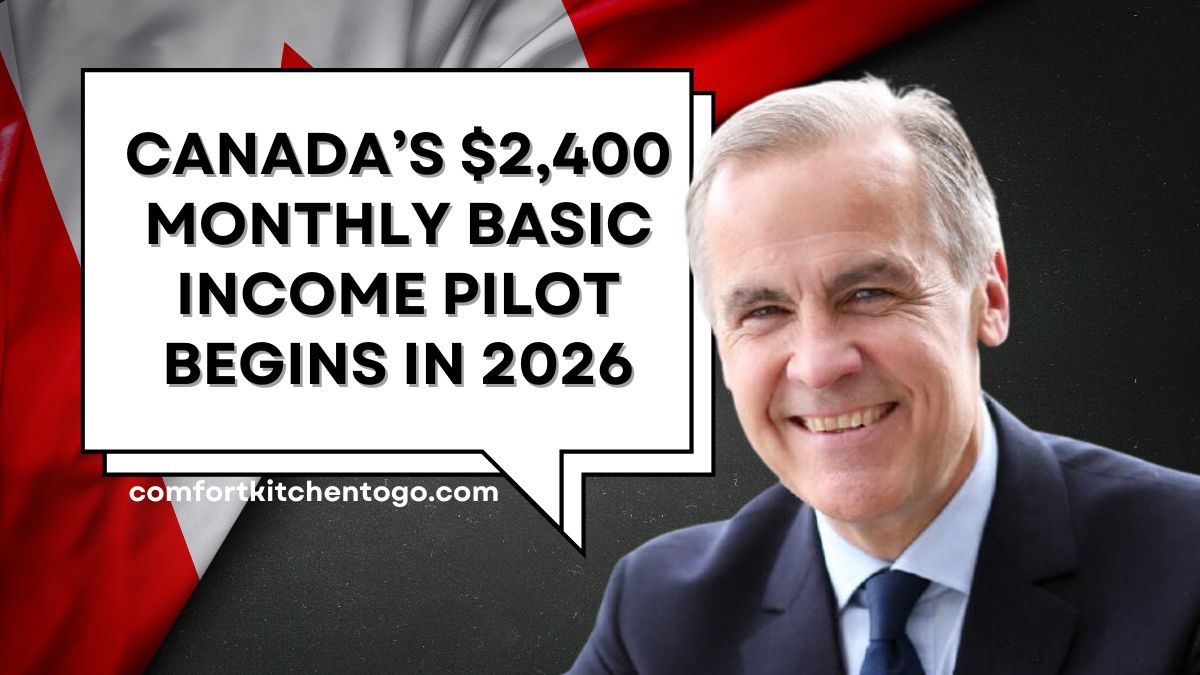Starting in 2026, the Government of Canada will roll out an ambitious Universal Basic Income (UBI) pilot aimed at reshaping the country’s approach to income support.
This initiative represents a shift toward unconditional financial assistance, granting monthly, tax-free payments to selected participants, without requiring employment.
The pilot’s goal is to analyze how guaranteed income impacts economic security, employment habits, health outcomes, and overall quality of life, especially in an economy influenced by automation, inflation, and gig-based work.
Understanding Canada’s Universal Basic Income Pilot
What Is the 2026 UBI Program?
The Universal Basic Income Pilot is a federally sponsored program that will deliver recurring payments to chosen participants. Unlike traditional welfare programs, which often have strict conditions, the UBI provides unconditional support to help Canadians manage basic needs.
Funds will be directly deposited into recipients’ bank accounts and can be spent freely—on housing, food, education, childcare, or savings.
Who Can Qualify for the UBI in 2026?
The pilot will focus on low- and middle-income households, ensuring diverse representation from across provinces like Ontario and British Columbia. Priority will be given to groups often underrepresented in policy testing.
Preliminary Eligibility Criteria
| Criteria | Details |
|---|---|
| Age | Must be 18 years or older |
| Income | Under $30,000/year for individuals |
| Location | Must reside in select provinces (e.g., ON, BC) |
| Existing Benefits | Must not be receiving equivalent aid |
| Target Groups | Includes Indigenous peoples, newcomers, persons with disabilities |
Final eligibility details will be confirmed once the necessary legislation is enacted in early 2026.
How Much Will Each Household Receive?
The pilot will last for 24 months, with payment amounts based on household size and income. All payments are non-taxable and do not interfere with other earnings.
Estimated UBI Payment Breakdown
| Household Type | Monthly Payment | Taxable? | Conditions |
|---|---|---|---|
| Single Adult | $1,200 | No | Income below $30,000/year |
| Couple (No Children) | $2,000 | No | Joint income under $50,000/year |
| Family with Children | $1,800–$2,400 | No | Based on dependents and income level |
Why Launch UBI Now?
The pilot arrives in response to deepening income inequality, housing challenges, and the unpredictability of gig jobs. The federal government believes that guaranteed income can:
- Lower poverty rates
- Reduce stress and financial insecurity
- Encourage participation in education, community service, or caregiving
- Modernize and unify welfare systems
This pilot aims to gather evidence-based insights to shape future policy and social program structures.
How This Trial Differs from Previous Attempts
Although Canada has tested UBI before, notably in Ontario in 2017, the 2026 pilot brings critical upgrades:
- Nationwide coordination with federal funding
- Cross-party political backing
- A larger and more diverse participant pool
- Inclusion of vulnerable and marginalized groups
- Focused data collection over two years
- Transparent milestones and reporting
This pilot is not just a short-term measure—it’s designed to examine UBI as a potential permanent feature of Canada’s social safety net.
What the Government Aims to Learn
The pilot will track how participants respond when income is no longer tied to employment.
Key Metrics of Evaluation
- Employment trends – Do recipients work more, less, or switch to better jobs?
- Physical and mental health – Does financial stability lead to improved wellness?
- Educational engagement – Will people return to school or invest in new skills?
- Spending behavior – How is the money used over time?
Will UBI Affect Other Government Benefits?
No. One of the program’s standout features is that it won’t interfere with other federal or provincial aid.
Participants will still be able to receive:
- Canada Child Benefit
- GST/HST Credits
- Disability or housing assistance
This approach ensures that UBI adds to, rather than replaces, existing support systems.
Can Participants Still Work While Receiving UBI?
Absolutely. The program encourages participants to:
- Continue employment
- Pursue education
- Engage in caregiving or volunteer work
Since payments are unconditional, UBI removes the stress of losing benefits when people try to work or improve their skills—thus promoting economic mobility rather than dependency.
The Canada Universal Basic Income Pilot 2026 marks a pivotal moment in the evolution of social welfare. With monthly, tax-free payments and a focus on inclusivity, the pilot will help answer critical questions about how guaranteed income can transform Canadian lives.
Whether it becomes a permanent part of Canada’s social fabric will depend on the data and stories that emerge over the two-year test period.
FAQs
When will the UBI pilot officially begin?
The pilot is set to launch in early 2026, following the passage of enabling legislation.
Can I receive both UBI and other federal benefits?
Yes. The payments are non-taxable and will not affect your eligibility for most federal or provincial assistance programs.
How long will the UBI payments last?
The program will run for 24 months, with regular reviews to track impact and performance across health, employment, and education sectors.

